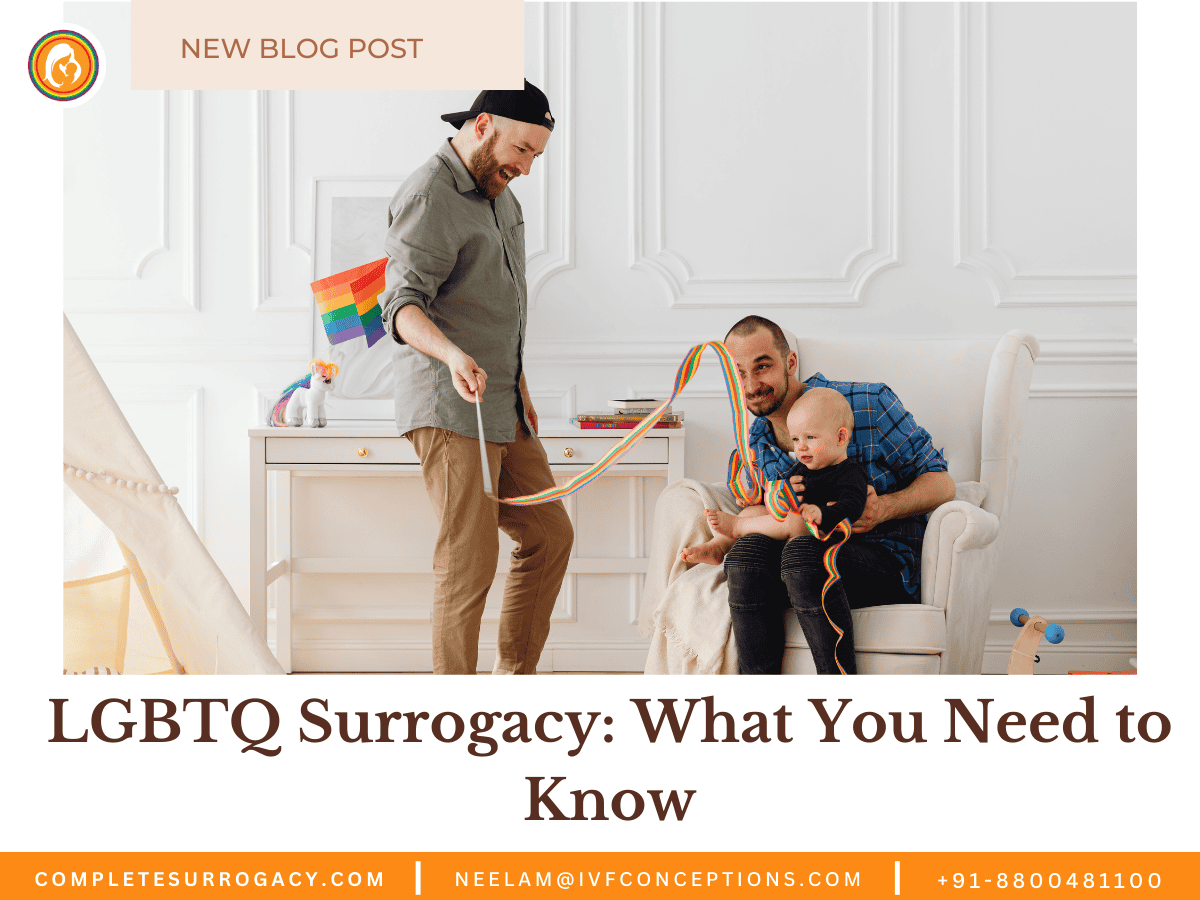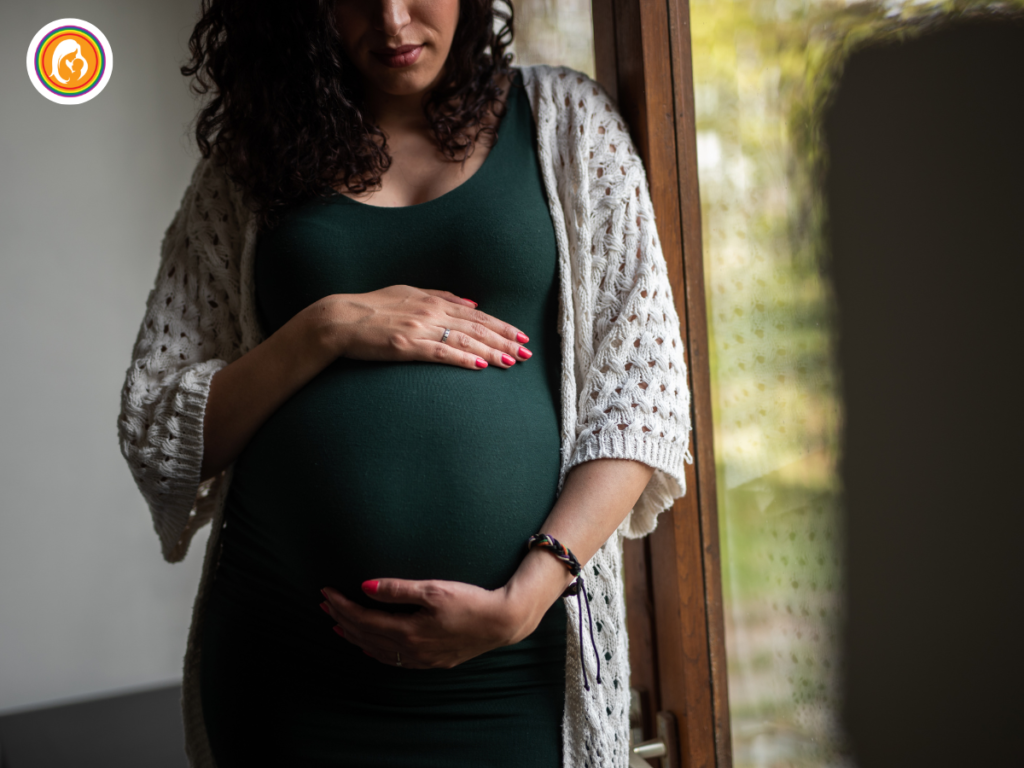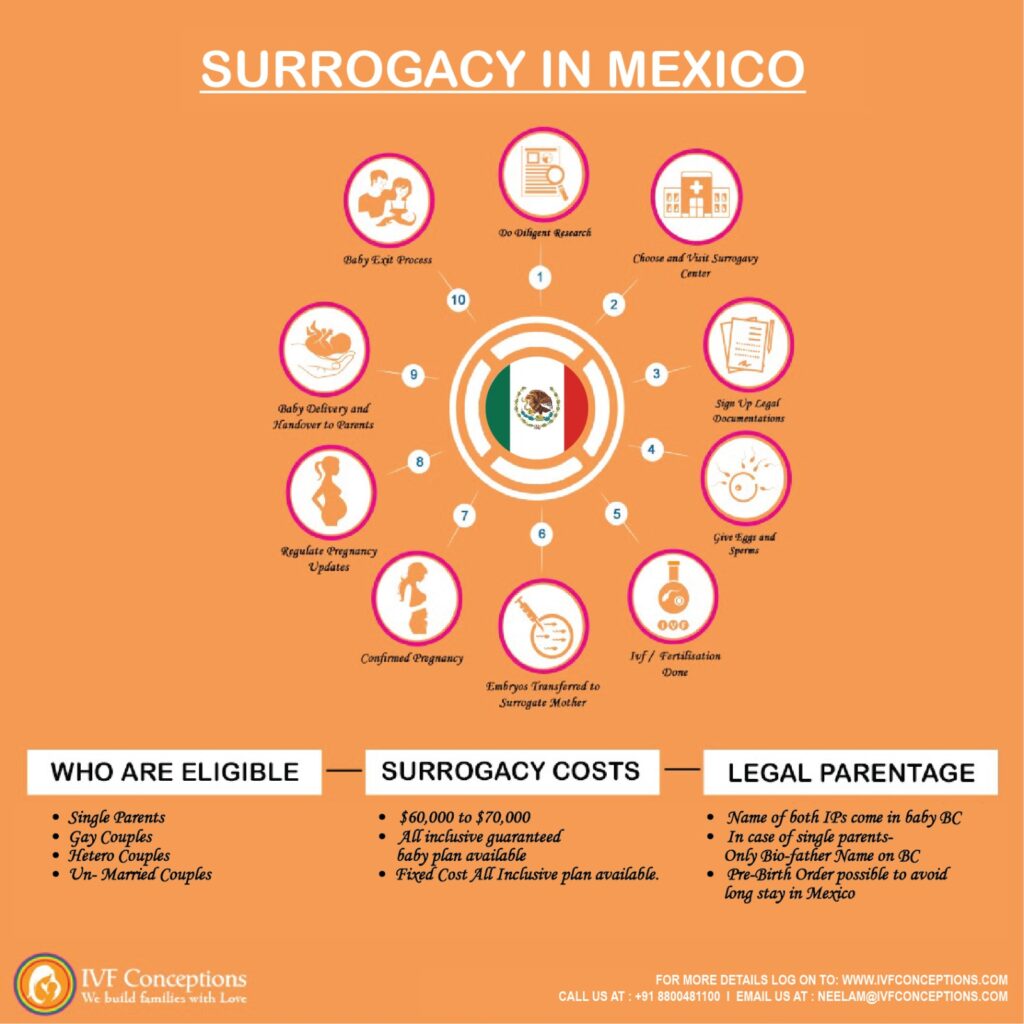LGBTQ Surrogacy: What You Need to Know

In today’s world, the concept of family is evolving, and LGBTQ Surrogacy is playing a crucial role in this transformation. More same-sex couples and individuals are exploring LGBTQ-friendly surrogacy options to fulfill their dream of parenthood. With advancements in reproductive technology and inclusive legal frameworks, the journey to parenthood has become more accessible than ever.
- Book an online appointment: Get a free online consultation.
- Call\W:+91-8800481100 Email:neelam@ivfconceptions.com
If you’re considering gestational surrogacy for LGBTQ couples, understanding the legal and medical aspects is essential. From choosing the right surrogacy agency to navigating international surrogacy laws, there are various factors to consider. This guide will walk you through every step, helping you make informed decisions and ensuring a smooth, ethical, and rewarding experience in building your dream family.
Key Takeaways
- Gestational surrogacy is a common choice for male same-sex couples to have children, reflecting an increasing trend in the LGBTQ community.
- Surrogacy offers the advantage of a biological relationship between the intended parents and the child, while the surrogate is not biologically related.
- Legal considerations for same-sex surrogacy vary by state, highlighting the importance of understanding the legal landscape.
- Specialized surrogacy agencies can guide LGBTQ individuals through the complex surrogacy process, from finding a gestational carrier to addressing legal aspects.
- Comprehensive planning and emotional, financial, and legal preparedness are essential for LGBTQ individuals embarking on the surrogacy journey.
More Resources to Read:
Is Surrogacy Legal in Georgia Country
Complete Surrogacy Cost in Georgia Country
Understanding Surrogacy for LGBTQ Couples
Surrogacy is a partnership where a person, known as the surrogate, carries a pregnancy for another individual or couple, the intended parent(s). This arrangement is crucial for the LGBTQ+ community. It allows them to build their families and become biological parents.
Definition of Surrogacy
Surrogacy is a family-building option for LGBTQ+ individuals or couples who cannot carry a pregnancy. The surrogate, not biologically related to the child, becomes pregnant through IVF. She carries the pregnancy to term and then gives the child to the intended parent(s) after birth.

Advantages of Surrogacy for LGBTQ Intended Parents
- Allows LGBTQ+ couples and individuals to have genetically related children and expand their families.
- Provides the opportunity for a biological connection between the intended parents and the child, which is often important for many LGBTQ+ families.
- Removes the complications associated with traditional surrogacy, where the surrogate is also the genetic mother of the child.
- Empowers LGBTQ+ individuals and couples to take control of their reproductive choices and fulfill their dreams of parenthood.
- Fosters a deeper sense of familial bonds and connection between the surrogate, the intended parents, and the child.
Surrogacy has become a viable option for LGBTQ+ couples and individuals who wish to have children. It offers them the chance to create families and experience the joys of parenthood.
How much does gay surrogacy cost?
The financial commitment for LGBTQ+ couples seeking surrogacy can be substantial, often between $200,000 and $250,000. This figure encompasses various expenses. These include compensation for the gestational carrier, agency fees, legal costs, and the cost of in-vitro fertilization.
Additionally, health insurance for the carrier, travel expenses, and the cost of egg and sperm donations are included. The final cost is influenced by the specific needs and preferences of the intended parents.
Average cost of gay surrogacy
In the United States, the average cost for surrogacy is roughly $140,000. The process involves multiple payments over time, not a single upfront payment. Initially, a retainer fee of about $25,000 is paid to start the process of finding a surrogate. A deposit of $60,000 to $80,000 is made when it’s time to create the embryos. The final payment is made when a match is confirmed, ensuring the surrogate is compensated before any pregnancy attempts.
This final payment is usually made 6 to 18 months after the initial payment.

Surrogacy cost with breakdown of price
Surrogacy costs can be broken down into several key areas:
- Surrogacy agency fees: These fees, typically ranging from $35,000 to $55,000, cover services such as surrogate matching, journey coordination, legal services, insurance support, surrogate screening, and escrow management.
- Fertility clinic fees: These fees, ranging from $25,000 to $45,000, include services like surrogate screening, egg donor screening, intended parent screening, embryo creation, pre-implantation genetic testing, and early pregnancy monitoring.
- Surrogate compensation: Surrogate fees range from $35,000 for first-time surrogates to $45,000 for experienced surrogates, with additional costs for lost wages, housekeeping, childcare, pet care, and location-based fees.
- Egg donor compensation: Egg donor compensation ranges between $8,000 to $20,000 or more, depending on specific preferences.
Here’s the table for surrogacy costs:
| Cost Area | Cost Range (USD) | Details |
| Surrogacy Agency Fees | $35,000 – $55,000 | Covers surrogate matching, journey coordination, legal services, insurance support, surrogate screening, and escrow management. |
| Fertility Clinic Fees | $25,000 – $45,000 | Includes surrogate screening, egg donor screening, intended parent screening, embryo creation, pre-implantation genetic testing, and early pregnancy monitoring. |
| Surrogate Compensation | $35,000 – $45,000 | Varies between first-time and experienced surrogates, with additional costs for lost wages, housekeeping, childcare, pet care, and location-based fees. |
| Egg Donor Compensation | $8,000 – $20,000+ | Depends on specific donor preferences and experience. |
This breakdown provides a comprehensive overview of surrogacy-related costs to help intended parents understand the financial commitments involved.
The Surrogacy Process for LGBTQ Intended Parents
Embarking on the surrogacy journey as an LGBTQ+ intended parent is both complex and rewarding. The process involves several key steps. These steps are designed to help same-sex couples and LGBTQ individuals create their families through this inclusive option.
- Consultation and Sign-on: This initial phase marks the beginning of the journey. It’s where LGBTQ+ intended parents decide to pursue surrogacy and select a reputable agency to guide them.
- Matching with a Surrogate: This is the exciting moment when intended parents find their surrogate. It’s a time of careful consideration to ensure the best match.
- Medical Screenings and Legal Work: This step includes the surrogate’s medical evaluation, legal contract negotiations, and the embryo transfer procedure.
- Pregnancy: During this time, the intended parents form a strong bond with the surrogate. They prepare for the baby’s arrival together.
- Parenthood: The moment of truth when intended parents meet and hold their baby for the first time. It’s a celebration of the successful completion of their lgbt surrogacy journey.
The surrogacy process for lgbtq surrogate intended parents is deeply personal. With the right support, guidance, and commitment, LGBTQ+ individuals can build the family they’ve always dreamed of.
Choosing a Fertility Clinic and Surrogate
For LGBTQ+ individuals seeking LGBTQ surrogacy, selecting an LGBTQ fertility clinic with a track record of working with diverse parents is crucial. It’s important to find a clinic that has experience with LGBT parents. Moreover, a fertility practitioner with expertise in gay surrogacy is vital for a successful surrogacy process for LGBTQ.
Criteria for Selecting a Fertility Clinic
Opt for a LGBTQ fertility clinic with IVF success rates of 80% or higher. The clinic should employ advanced technologies like ICSI, classic IVF, PGD/PGS, and have proper storage and handling of donated eggs and sperm. It’s also beneficial to choose clinics with a strong LGBTQ+ client base and offer emotional support.
Finding the Right Gestational Carrier
The journey of surrogacy for gay couples starts with identifying a suitable LGBTQ gestational carrier. A LGBTQ surrogacy agency can assist in this search. The agency will screen potential surrogates based on health, pregnancy history, and LGBT-friendliness. The surrogate also undergoes a medical screening to ensure she can carry the pregnancy safely.

What is surrogacy timeline for gay couples
The surrogacy timeline for gay couples spans about 15 to 18 months. It is divided into three phases: finding a LGBTQ surrogate (3-6 months), the medical and legal process (2-3 months), and the 9-month gestation period. The time needed for embryo creation is also a factor in the overall timeline.
Stepwise surrogacy process- step by step guide
- Consultation and sign-on, where the decision to pursue LGBTQ surrogacy is made and an agency is chosen;
- Matching with a LGBTQ gestational carrier;
- Medical screenings and legal work, including the surrogate’s medical screening, contract negotiations, and embryo transfer;
- Pregnancy, where the intended parents develop a strong relationship with the surrogate; and
- Parenthood, the joyous moment when the intended parents meet and hold their baby for the first time.
International surrogacy countries
Surrogacy laws differ worldwide, yet some countries are more welcoming for LGBTQ+ families. These places offer a smoother and more open path to parenthood compared to others.
Information on countries and their surrogacy laws:
| Country | Commercial Surrogacy | Altruistic Surrogacy | Surrogacy Status |
| Australia | Prohibited | Allowed | Altruistic surrogacy is legal in all jurisdictions. Commercial surrogacy is a criminal offense. |
| Canada | Banned | Allowed | Only altruistic surrogacy is permitted. Compensation for gestational carriers is limited to approved expenses. |
| Colombia | Uncertain | Allowed | There are no clear rules, but altruistic surrogacy is performed and well tolerated. |
| Greece | Banned | Allowed | Heterosexual couples, single females allowed. |
| India | Prohibited | Allowed | Altruistic surrogacy is permitted for certain couples based on medical and age criteria. |
| Israel | Allowed | Allowed | Gestational surrogacy is legal under the Embryo Carrying Agreements Law. |
| Kenya | N/A | N/A | No legal regulations/laws for surrogacy in Kenya. |
| Mexico | Allowed | N/A | Surrogacy, along with ovum and sperm donation, has been legal since 1992. |
| New Zealand | N/A | Allowed | Altruistic surrogacy is legal. |
| Thailand | Banned | N/A | Commercial surrogacy is criminalized under the Medical Council Act. |
| Ukraine | Allowed | Allowed | Surrogacy and egg/sperm donation are legal and supported by liberal laws. |
| United Kingdom | N/A | Allowed | Surrogacy laws vary across different states/territories in the UK. |
| United States | Varies by state | Allowed | Surrogacy laws vary by state, some are surrogacy-friendly, while others restrict or penalize commercial surrogacy. |
Best Countries for Gay Surrogacy
Mexico, Argentina, Colombia, and Cyprus are leading destinations for LGBTQ+ surrogacy. These nations have laws that support same-sex surrogacy, making it easier for LGBTQ+ couples to become parents.
Legal Countries for LGBTQ+ Surrogacy
Mexico, Argentina, Colombia, and Cyprus are legal and LGBTQ+-friendly for surrogacy. They boast a well-organized surrogacy industry and a simpler process for same-sex couples. This often comes at a lower cost than in the United States.
Surrogacy in Mexico for LGBTQ+ Couples
Mexico is a top choice for LGBTQ+ couples looking into surrogacy. It has a robust surrogacy industry and laws that support same-sex surrogacy. This makes the journey more accessible and affordable for LGBTQ+ parents.

Surrogacy in Argentina for LGBTQ+ Couples
Argentina is also a sought-after destination for LGBTQ+ couples. It has legalized same-sex marriage and has progressive surrogacy laws. This offers a developed surrogacy industry and a more budget-friendly option compared to the United States.
Surrogacy in Colombia for LGBTQ+ Couples
Colombia is another favorable country for LGBTQ+ surrogacy seekers. It has legalized same-sex marriage and supports surrogacy for same-sex couples. Colombia’s surrogacy industry is established, and costs are often lower than in the United States.
Surrogacy in Cyprus for LGBTQ+ Couples
Cyprus is becoming a key hub for LGBTQ+ surrogacy. It has legalized same-sex civil unions and has laws that favor surrogacy for same-sex couples. Cyprus offers a developed surrogacy industry and a streamlined process for LGBTQ+ parents.
Pros and Cons of LGBT surrogacy
Surrogacy is a complex yet rewarding journey for LGBTQ+ intended parents, offering both benefits and challenges. It provides a chance for LGBTQ+ couples and individuals to have biologically related children, expanding their families. This allows for a meaningful genetic connection to the child, even if the parents cannot carry the pregnancy themselves.
However, the surrogacy process also presents significant hurdles. The high costs, legal complexities, and emotional demands can pose substantial barriers for LGBTQ+ prospective parents. Additionally, the lack of explicit legal protections against discrimination in some regions can make the surrogacy journey more arduous for LGBTQ+ families.
Advantages of LGBTQ Surrogacy
- Ability to have genetically-related children
- Opportunity to expand and grow LGBTQ+ families
- Fulfillment of the desire to parent and raise children
- Gestational surrogacy provides a biological connection to the child
Challenges of LGBTQ Surrogacy
- High financial costs associated with the surrogacy process
- Complex legal requirements and lack of consistent laws across jurisdictions
- Emotional demands and potential for conflict during the surrogacy journey
- Lack of explicit legal protections against discrimination for LGBTQ+ families in some regions
Despite the challenges, many LGBTQ+ individuals and couples have successfully navigated the surrogacy process. They have fulfilled their dreams of parenthood and built loving families. With careful research, preparation, and the support of experienced professionals, the advantages of LGBTQ surrogacy can outweigh the obstacles.
Additional Resources to Read:
Exploring Costs of Gay Surrogacy
Finding Surrogates for Gay Couple
Affordable Surrogacy for Gay Couples Options
Surrogacy Cost for Gay Couples
Conclusion
Surrogacy has become a common way for LGBTQ+ individuals and couples to become parents. It involves important financial and legal considerations. Yet, it allows LGBTQ+ families to have genetically related children and build their families.
By partnering with reputable agencies, understanding legal aspects, and preparing emotionally and financially, LGBTQ+ parents can successfully navigate their surrogacy journey.
If you’d like to learn more about IVF, Egg Donation, or surrogacy services globally, check out the rest of our website at Complete Surrogacy Agency. We offer legally secure and affordable surrogacy consulting services for FREE.
Get in touch for FREE SURROGACY CONSULTING:
Mobile: +91-8800481100 ( WhatsApp, Line, Viber)
Email: neelam@ivfconceptions.com
FAQs for same-sex surrogacy process
What is the definition of surrogacy?
Surrogacy is a partnership between adults who are fully informed and consent. It involves a person who can carry a pregnancy, offering to help another person’s family grow.
What are the advantages of surrogacy for LGBTQ+ intended parents?
Surrogacy provides unique benefits for the LGBTQ community. It allows for a biological connection between the intended parents and the child. This connection is without the surrogate’s biological involvement, simplifying family formation.
How much does gay surrogacy typically cost?
The cost for LGBTQ+ couples to pursue surrogacy can vary from $200,000 to $250,000. This estimate includes various expenses. These range from the surrogate’s compensation and expenses to agency and legal fees, in-vitro fertilization costs, health insurance, travel, and egg and sperm donations.
What are the key steps in the surrogacy process for LGBTQ+ intended parents?
The journey for LGBTQ+ intended parents through surrogacy involves several critical steps. These include: 1) Initial consultation and agreement, 2) finding a suitable surrogate, 3) undergoing medical screenings and legal preparations, 4) the pregnancy phase, and 5) achieving parenthood.
What should LGBTQ+ intended parents consider when selecting a fertility clinic?
When choosing a fertility clinic for surrogacy, LGBTQ+ intended parents must focus on clinics experienced with diverse parental orientations. The clinic’s history with LGBT parents is a key factor to consider.
What are some of the best countries for LGBTQ+ couples to pursue surrogacy?
Countries like Mexico, Argentina, Colombia, and Cyprus are highly regarded for surrogacy by LGBTQ+ couples. These nations have laws that generally support same-sex surrogacy arrangements.
Source Links
- https://reproductivehealthwellness.com/surrogacy-gay-couples-what-to-know-before-taking-decision/ – Surrogacy For Gay Couples: What To Know Before Taking A Decision
- https://www.americansurrogacy.com/parents/gay-surrogacy – Gay Surrogacy – Surrogacy Services for Gay Couples
- https://www.socalfertility.com/lgbt-fertility/surrogacy-gay-couples/ – Surrogacy for Gay Couples
- https://www.cnn.com/2019/06/14/health/same-sex-surrogacy-faq/index.html – Top 10 questions about surrogacy for same-sex couples | CNN

Author Bio: Neelam Chhagani is an International Surrogacy Expert with 15 years of experience in the fertility and surrogacy domain. As the founder of IVF Conceptions and Complete Surrogacy, she has guided over 4,000 intended parents worldwide on their surrogacy journey to parenthood. Recognized as a trusted authority, she specializes in holistic infertility solutions and third-party reproduction consulting.
Holding an MA in Counselling Psychology and a PGD in Mental Health, Neelam is a proud member of the European Fertility Society (EFS) and the European Society of Human Reproduction and Embryology (ESHRE). She is also a leading surrogacy blogger, providing valuable insights into ethical and practical surrogacy solutions.
Since 2010, committed to supporting ALL family types, Neelam has been passionate about helping intended parents grow their families with compassion, integrity, and a focus on secure and affordable surrogacy options Globally.
Learn more about Neelam:
https://www.ivfconceptions.com/neelam-chhagani-surrogacy-consultant/
https://www.linkedin.com/in/neelam-chhagani-92892229/















I was introduced to Neelam by a friend who worked with Neelam for surrogacy. Neelam is absolutely wonderful. I am a single male and the journey to fatherhood is not that easy. Neelam connected me to a program ideal for my circumstances. She was with me throughout the pregnancy providing advice and guidance along the way. I am so grateful I found her and am thrilled today that I have a beautiful daughter. I highly recommend Neelam to anyone who is on a journey to become a parent. Having a child has changed my world for the better. I wish others success with their own journey and recommend you connect with Neelam to find a path that is best for you.
SA (USA)